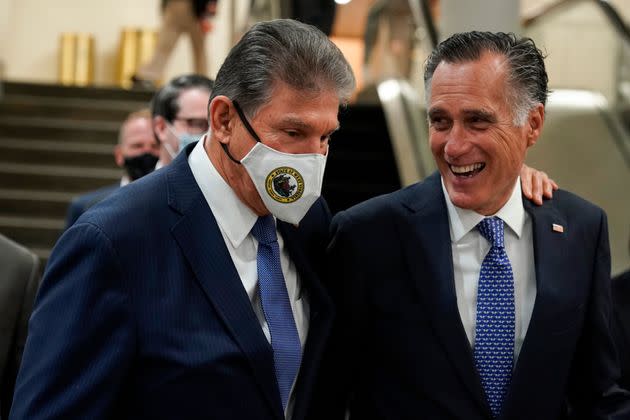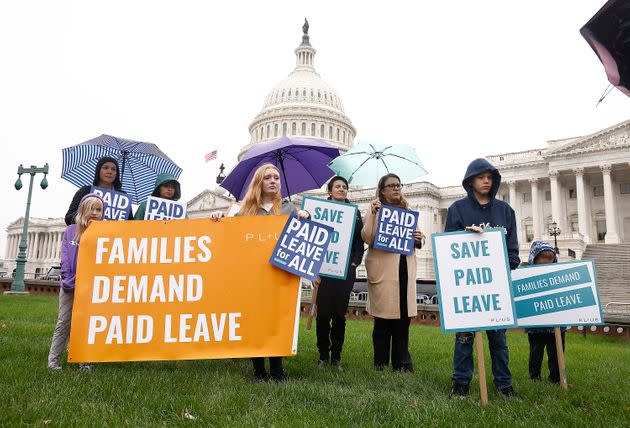Bipartisan Paid Leave Won’t Work
- Oops!Something went wrong.Please try again later.
Democrats’ paid leave proposal is on life support, with Sen. Joe Manchin (D-W.Va.) continuing to withhold the single vote Democrats need to implement one of the most popular policies in their agenda.
The policy would ensure all American workers have access to at least four weeks of paid family and medical leave, starting 2024. Manchin is opposed to including it in the Build Back Better bill, the sweeping spending and tax proposal Democrats are hoping to pass on party lines since Republicans have made clear they won’t back it.
Manchin is not necessarily against the whole policy, but he wants it to be bipartisan.
That leaves Democrats and advocates with the potentially more difficult job of convincing the West Virginia senator that that’s not going to happen.
Last week, after weeks of conversation with Manchin, Sen. Kirsten Gillibrand (D-N.Y.) reached out to Sens. Susan Collins (Maine) and Lisa Murkowski (Alaska), two Republicans she thought might be open to working on a bipartisan paid leave proposal.

Collins told HuffPost the conversations were extremely preliminary, simply to find out if there was common ground. Over the weekend, Gillibrand said she had come to the conclusion that Democrats would have to start a paid leave program on their own, without Republican support.
“This is the only moment to get paid leave done,” Gillibrand said on CBS’s Face The Nation. “The bipartisan ideas [Manchin] has — they will not come to fruition with the Republican senators that are interested in paid leave ... ”
“I’ve looked and I’ve talked to all the Republicans who are interested in paid leave, and none of them have an interest in what he wants to do,” she continued.
House Democrats included four weeks of paid family and medical leave in their version of the Build Back Better bill passed last week — down from the 12 weeks initially backed by the White House and proposed by Democratic leaders. The benefit would be paid out at different rates, depending on the worker’s income, either through a new federal benefit or through existing state or employer plans. The Senate, despite Manchin’s continued opposition, is including the same language as the House’s proposal in its bill.
Gillibrand says Manchin wants a program that’s paid for by both employers and employees with a small payroll tax. Republicans don’t support that.
“Trying to forge a bipartisan path on paid leave means millions of families won’t have paid leave any time soon or substantial portions of people will be cut out,” Vicki Shabo, a paid leave expert with liberal-leaning think tank New America, said. “There is no plausible ‘Plan B’ that will get benefits to people in a timely way.”
Their pessimism is based on years of bipartisan attempts to get paid leave into law. Despite it being a remarkably popular proposal (also with Republicans), the United States remains an outlier globally, as the only country among its international peers to not offer any kind of paid leave protections for workers.
Arguably among the biggest paid leave policy win was passed under President Donald Trump, with Republican support, after Democrats used Trump’s desire for a Space Force as leverage to win paid leave for new parents in the federal workforce.
That policy excluded private sector workers and was exclusively for new parents. Only about 20% of workers in the private sector have access to paid family leave and roughly 42% have access to paid medical leave. Low-wage workers are the most likely to not have access to paid leave.

Republicans and Democrats recognized this shortcoming briefly during the early months of the COVID-19 pandemic, enacting a brief mandate for certain large employers to offer paid medical leave in case a worker got COVID-19 or had to care for someone with the illness. The federal government offered tax credits to businesses to offset the costs.
Republicans almost immediately stopped supporting the policy after its initial passage, and by the end of 2020 all that was left was a voluntary tax credit program, which the vast majority of businesses didn’t participate in. Those tax credits have already expired.
There are still some tax credits on the books around paid parental leave, passed through partisan Republican-passed 2017 tax law, that were similarly so insubstantial that advocates consider them immaterial.
“The takeaway is that they just don’t work,” Dawn Huckelbridge, director of advocacy group Paid Leave For All, said of voluntary tax incentive programs. “That’s not going to create sufficient access. We know that the private sector just hasn’t taken care of this.”
Two other proposals ― one from Sens. Marco Rubio (R-Fla.) and Mitt Romney (R-Utah), and another from Sens. Kyrsten Sinema (D-Ariz.) and Bill Cassidy (R-La.) ― capture just how far Republicans are from a universal paid leave program.
Romney and Rubio proposed allowing parents to take out from their Social Security early to take time off after the birth or adoption of a new child. The bipartisan version of this proposal, from Sinema and Cassidy, wanted to allow parents to advance thousands of dollars in child tax credits to pay for their time off. (Democrats have since expanded the child tax credit, and pay it out in advance on a monthly basis.)
Sinema, now, is fully supportive of Democrats’ plan on paid leave, which would offer a direct paid leave benefit for workers who either had a baby, are sick, or have to care for a loved one.
“The common theme is that a lot of these proposals that were called bipartisan paid leave proposals are neither paid nor leave,” Huckelbridge said. “It’s just moving money around.”
Democratic staffers, lawmakers and advocates all have the same message: If comprehensive paid leave is not passed now, by Democrats, it’s just not going to happen.
This article originally appeared on HuffPost and has been updated.



